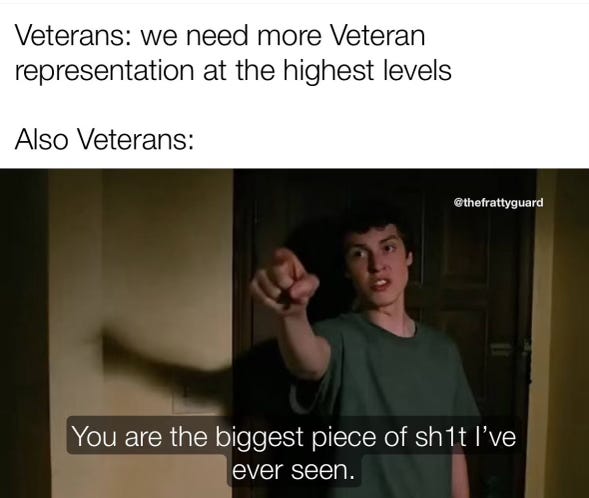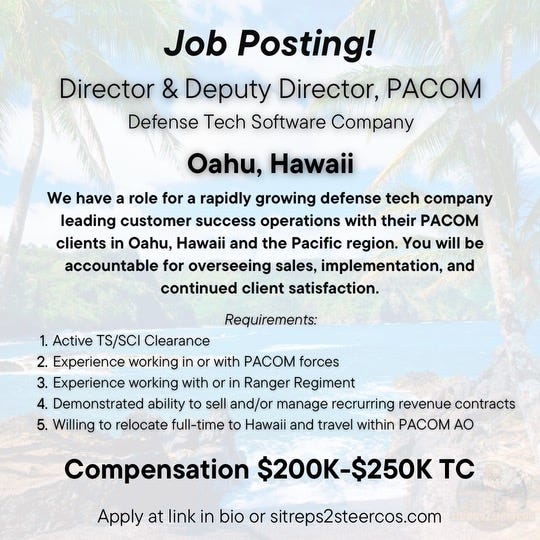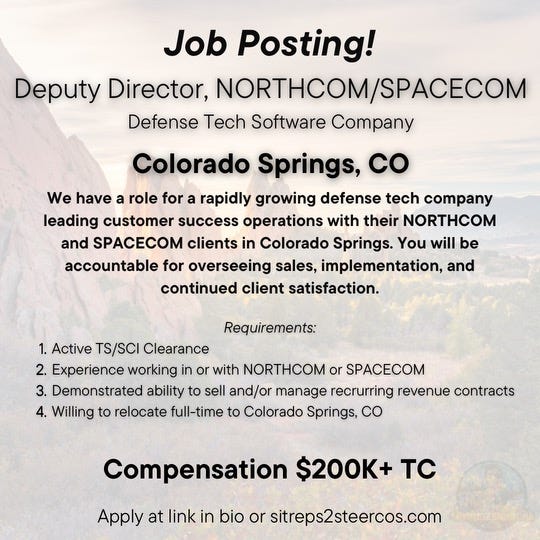Health Insurance Outside the Military
Why you might miss Tricare and comments on the Tim Walz Controversy
Hello Weekly Sitreps Readers!
When I was in Afghanistan from 2010 - 2011, part of the way I passed my free time was playing video games (like a lot of service members). I played Fallout: New Vegas during that time and I distinctly remember how much trouble my laptop had playing that game because it was so graphically intensive. Fast forward to today, and I have rediscovered playing Fallout New Vegas again (in my very limited free time) on my crazy over powered xbox. It’s been a lot of fun revisiting this game and also I am amazed at much smoother it runs on a super powered modern gaming system. Playing the game brings back memories of my early 20’s and very much being on my own in the Army (obviously my saint of a wife was with me, I mean like professionally). West Point was now a distance memory, and I was a junior officer in a Task Force Phoenix (3-10 Combat Aviation Brigade) in RC-East Afghanistan. It was a very confusing time, I was learning a lot, was very new, generally terrifying myself when I flew on missions and also was learning to deal with the many personalities that were present in a combat unit in the Army, and specifically in an aviation combat unit (where a large percentage of the pilots were former enlisted). I also got to see a lot of cool airplanes.
I mention this because like most veterans, I’ve been following the controversy around Kamala Harris’s VP pick Tim Walz. This not really a meme I posted the other day about the issue caused quite the stir, which was the intent.
I find the whole controversy around his military service to be tiresome. Mostly because I feel it’s based around the identity of his politics, rather than something actually substantive about what he did (or did not do in the service). I think this WSJ Editorial Board Op-Ed does a great job of summing up the “thin gruel” of attacking his service record. If you have a reason to oppose Tim Walz (and many do based on his political record), do it on his policies, rather than the bureaucratic minutiae of retiring before a deployment that he may or may not have known about, along with the whole retiring a rank below Command Sergeant Major.
Particularly troubling to me, is the idea that we as Veterans (and I include JD Vance in this) attacking a fellow veteran over his service record instead of policy issues. This isn’t a defense of Tim Walz, who could have been clearer about his record in public facing comments. But to the vast majority of America, military service is a opaque window, and any veteran knows just how little the average civilian understands when it comes to the complexities of the department of defense. I find this to be an instructive moment to most veterans. Why? Everybody who has ever served (and particularly those who deployed), know that there are tiers” of service within the military, and everyone is responsible for how they represent their time in service.
For example, I was an 15A aviation officer in the Army. I was qualified in a UH60 Blackhawk. I was never a pilot in command or an air mission commander. I do not have a combat action badge as I was never shot it in Afghanistan, despite flying in some of the most dangerous parts of Afghanistan and my brigade losing over 10 aircraft while we were deployed. When I speak to other veterans, I try to be accurate about my time in service. But it’s confusing and hard. Service is not universal nor identical. One of my neighbors and good friends, had served 25 years as a naval aviation officer (WSO in Tomcats and Hornets). When I talk with him, its like being transported to another world, where someone has a better understanding of the life you used to live, rather than the life you live now. But at the end of the day, he only has broad strokes the particular life I lived when I was in. Isn’t this complicated?
The point dear reader, is that you know best how to represent your service, and you know how other veterans will interpret it. Be intellectually honest, and be thoughtful about what you tell other people when you were in. War stories are like fishing stories, they tend to get more ridiculous the longer time goes on.
Anyway, for this weekly sitrep we are going to talk about a super exciting topic. Health Insurance in the private sector. Health Insurance is by and large on autopilot in the military (with all the benefits and drawbacks it represents), but post military it is one of the most important things you should be knowledgeable about. Can’t wait to get rid of Tricare? Well then get ready for the healthcare free market. Which has a shit ton of twists and turns for you.
News Articles I found Interesting Last Week
WSJ - Tech Bros Are Betting They Can Help Win a War With China
WSJ - Welcome to Y’all Street, Texas’ Burgeoning Financial Hub
WSJ - America Saved the Grizzlies, and Now the Bears are Invading Towns
CNN - Walz ‘misspoke’ in saying he served ‘in war,’ Harris campaign says
Sitreps Jobs!
We have multiple new hot jobs that we are actively recruiting for! Follow us on LinkedIn to see all the hot new jobs we are posting.
The first role is a Director and Deputy Director role in Oahu, Hawaii. Apply here.
The second role is a Deputy Director role in Colorado Springs, CO. Apply here.
The third role is a Director and Deputy Director role in Italy. Apply here.
🚨MBA/UNDERGRAD FINANCE RECRUITING OPP 🚨
RBC Capital Markets is hosting veterans for a symposium at their NYC office on September 19 with a networking dinner to follow.
This event is open to full-time undergraduate students graduating 2025, 2026 or 2027, first year full-time MBA students, part-time MBA students graduating December 2024 or Spring 2025. Register here!
Note that RBC offers an amazing diversity fellowship to veterans.
RBC is seeking first year MBA students enrolled full-time at U.S. colleges and universities students with U.S. military service backgrounds. Successful candidates will earn a Summer Associate position within Global Investment Banking and an $80k award paid in two lump sums ($40k at beginning of internship; $40k upon return full-time).
So definitely check out this RBC event, you might be able to get a superday out of it at a top investment bank.
Health Insurance In the Private Sector
Disclosure: The information contained in this article is for educational and informational purposes only and does not constitute financial, investment, or legal advice. Any references to specific securities or investments are for illustrative purposes and do not constitute a recommendation to buy, sell, or hold such securities. Readers should seek their own professional advice before making any investment decisions. The author and their firm are not responsible for any loss or damage resulting from any decisions made based on the information provided in this article.
This is part two in a four-part series covering financial planning basics for transitioning Veterans pursuing an MBA, guest authored by Henry Preston, Founder of Veteran Wealth Planning.
Health Insurance.
Health insurance was easy in the military, you had TRICARE. But in the civilian world you have more options. You can get health insurance through your employer, your spouse’s employer, or on the open marketplace (remember that thing called the Affordable Care Act, otherwise known as Obama Care?).
If you’re getting out of the military soon, you or your spouse are probably worried about healthcare and how you will get coverage. Before we discuss health insurance while you’re enrolled in grad school, let’s talk about the most common method, through an employer.
Group Health Insurance.
Generally, families get healthcare through one of their employers because it is the most cost-effective option. The employer finds a health insurance provider to contract with, gets a group rate for several tiered coverage options, decides how to allocate costs between employer and employee, and then the employee pays their portion. This employee portion is called a premium and is usually around 20% of the total annual cost. Some employers pay more of the total annual cost, some pay less. The employee can usually add their family members to their healthcare at an additional cost, with larger families receiving reduced cost options.
In the military, TRICARE was the group health insurance, Uncle Sam was your employer, and your out-of-pocket premium as the employee was super affordable. So what options do you have after the Military if you or your spouse won’t immediately have health insurance through an employer? You can go on the open marketplace and find health insurance, or if you don’t feel like going through the hassle of changing providers you can access the Continued Health Care Benefit Program (CHCBP).
CHCBP.
CHCBP is the military version of COBRA, the Consolidated Omnibus Budget Reconciliation Act, and enables you to bridge the gap between TRICARE and your next health insurance provider. CHCBP offers similar benefits to TRICARE, and in
Keep reading with a 7-day free trial
Subscribe to The Weekly Sitrep to keep reading this post and get 7 days of free access to the full post archives.









